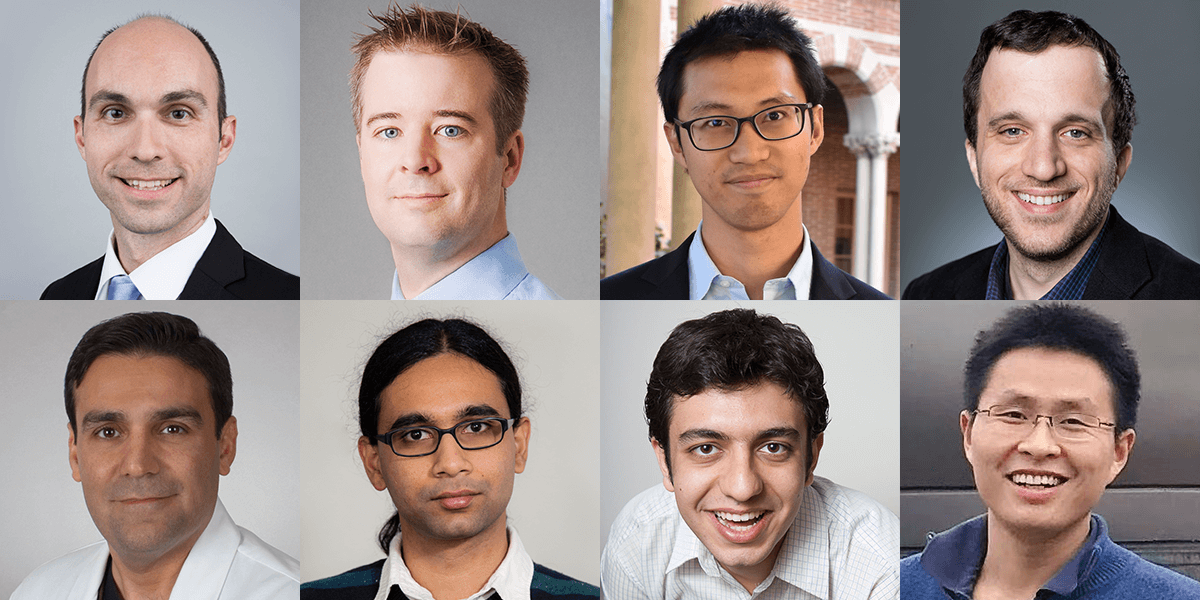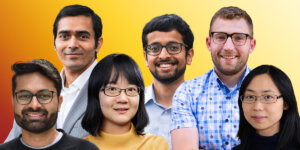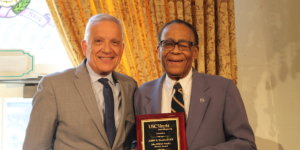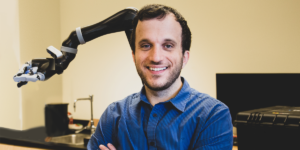
Left to Right: Ivan Bermejo-Moreno, Nick Graham, Wade Hsu, Stefanos Nikolaidis, Niema Pahlevan, Mukund Raghothaman, Meisam Razaviyayn, Jiapeng Zhang
It’s a record year at the USC Viterbi School of Engineering.
Eight USC Viterbi assistant professors received the prestigious National Science Foundation (NSF) CAREER Award in 2022. Recipients of the award are early-career faculty members handpicked as having the potential to serve as academic role models in research and education to lead advances in their respective fields.
Over the last two years, 13 NSF CAREER Awards have been given to USC Viterbi faculty members. Each year The White House Office of Science and Technology Policy makes the final selection and announcement of the awardees.
This year’s winners are:
Ivan Bermejo-Moreno, assistant professor of aerospace and mechanical engineering; Nick Graham, assistant professor of chemical engineering and materials science; Wade Hsu, assistant professor of electrical and computer engineering; Stefanos Nikolaidis, assistant professor of computer science; Niema Pahlevan, assistant professor of aerospace and mechanical engineering; Mukund Raghothaman, assistant professor of computer science; Meisam Razaviyayn, assistant professor of industrial and systems engineering, computer science, and electrical and computer engineering; and Jiapeng Zhang, assistant professor of computer science.
Ivan Bermejo-Moreno – Flexibility of Fluid Flows
Bermejo-Moreno has studied turbulent fluid flows for nearly two decades, combining physical modeling and high-performance computing to better understand and analyze different flow scenarios with applications for supersonic flight, as well as underwater vehicles. Understanding how flow dynamics change when different variables are introduced is important in identifying how to create the most favorable flow for efficient, high-speed motion — whether through the air or through water.
His most recent research, supported by the NSF Career Award, aims at understanding interactions of fluid and structure dynamics when a strong shock separates a turbulent, or chaotic flow over a thin, flexible panel. High-speed, turbulent flows bounded by such deformable walls or boundaries can demonstrate effects like shockwaves or intense heating that will cause mechanical and thermal coupling of the fluid and the solid structure it flows over. This is what Bermejo-Moreno and his team seek to better understand: how flows are changed when interacting with flexible panels versus rigid walls.
Said Bermejo-Moreno: “Interactions of compressible turbulent boundary layers, shockwaves and flexible panels are critical to the design and operation of high-speed flying vehicles and propulsion systems such as space launch systems, rockets and scramjet engines. An increased understanding of the coupled physics of these interactions will enable new control strategies to increase flight performance and safety.”
Novel to the research is its methodology which incorporates large eddy simulation of the flow with specialized solid and thermal solvers (which help calculate changes in a solid object and changes in temperature respectively) on body-fitted, unstructured meshes. This methodology will enable accurate and feasible predictions in complex geometries.
As part of this award, the researchers will partner with Washington Elementary STEM Magnet School of Pasadena, which serves over 95% students from under-represented minorities. Students from third to fifth grade will learn about fluid motion through flow visualizations presented by the researchers.
Nick Graham – Engineering Immune Cells to Fight Cancer
Graham uses systems biology approaches to understand and develop novel therapeutic approaches for cancer and other human diseases.
His NSF CAREER Award-supported research focuses on the promising area of chimeric antigen receptor (CAR) T cell therapy. This is a form of immunotherapy in which immune cells are engineered to express CARs — synthetic proteins that direct the immune cells to target and kill cancer cells.
Despite significant progress in CAR immunotherapy using T cells, including several FDA-approved therapies, there remain substantial roadblocks to making CAR-T cells a safe and effective therapeutic option, including increasing the percentage of patients with long-term disease control and minimizing toxic side effects.
“This research proposes to use phospho-proteomics — a technology that can provide detailed measurements of CAR signaling — to better understand how CAR signaling encodes CAR-T cell function,” Graham said. “This knowledge will enable engineering of next-generation CARs with better efficacy and persistence for improved cancer immunotherapy.”
Graham said that fundamental studies of CAR signaling are limited and the field lacks a quantitative understanding of how CAR signaling controls CAR-T cell function.
“This work will expand knowledge of CAR signaling and CAR design criteria. Because of the modular design of CARs, the fundamental science generated will be broadly applicable to CAR-T cell therapies for many tumor types,” Graham said.
The project will also involve a multi-year outreach and educational training plan with a local high school to provide underrepresented student populations with hands-on experience and to spark interest in STEM fields and engineering approaches to human health. The project will also provide research training opportunities for high school, undergraduate and graduate students.
Wade Hsu – Controlling Light in Multi-Channel Nanostructures
Hsu’s work focuses on photonics in complex systems, where physics and applications meet. He has pioneered new ways to confine light in nanophotonic structures and to control wave propagation in scattering media, as well as inventing transparent displays based on resonant scattering. Hsu’s NSF CAREER Award, titled “Nonlocal Metasurfaces with All-Angle Control of Light,” will initiate another research direction.
Devices such as cameras, endoscopes, LiDAR, and augmented reality headsets all require an angle-dependent control of light — redirecting incoming light from different directions to different sensors. Nanophotonics has the potential to significantly miniaturize these devices while providing greater control, enabling less invasive endoscopy with higher image quality, more comfortable AR headsets, thinner mobile devices, etc. However, researchers first need the ability to model and to design large-area nanostructures that couple the many angular degrees of freedom.
“This award will support our study of massively-multi-channel optical systems such as nonlocal metasurfaces,” said Hsu. To that point, Hsu plans to build the analytical and numerical tools for modeling nanophotonic structures that couple numerous propagation channels, as well as exploring new designs that can enable compact cameras with a large field of view and high-speed spatial light modulators.
For Hsu, the award represents the third straight year that the young researcher has been recognized for his achievements. He received the Charles Lee Powell Faculty Research Award from USC Viterbi in 2020 and the Sony Faculty Innovation Award in 2021.
Stefanos Nikolaidis – Making Robotics Safe and Trustworthy
Along with his role as an assistant professor of computer science, Nikolaidis directs the Interactive and Collaborative Autonomous Robotics Systems (ICAROS) lab at USC, which focuses on enabling robots to help people with everyday tasks.
Nikolaidis’ research, recognized by his new NSF CAREER Award, specializes in advancing the science of robust, human-robot interactions by generating challenging and realistic scenarios in simulation.
“We want to have a diverse range of high-quality scenarios that are complex and realistic,” said Nikolaidis. “What the proposal was about, and the work of my group has been to make fundamental advances on how we can generate diverse scenarios with algorithms to prevent catastrophic failures in human-robot interactions.”
Nikolaidis says he hopes the results of this work will help lead to safer human-robot interactions by providing the field of robotics with the tools necessary for allowing robots to adjust to new and challenging scenarios.
“Failures have a very detrimental effect on a user’s trust in the system, so it’s very important to have systems that are robust not just for safety but also because that’s how people will be able to trust these robotic systems,” said Nikolaidis.
A fundamental part of the research activities of this project will also include an education plan to introduce robotics education and artificial intelligence to students in South Los Angeles in connection with the USC Viterbi K-12 STEM Center.
Niema Pahlevan – Early Cardiovascular Disease Detection for Vulnerable Communities
Pahlevan witnessed early on how silent killers, like heart attacks, can be difficult to diagnose, treat and prevent. In his research, he’s spent years coupling physics and mathematics tools with the study of biological systems to better understand and detect life-threatening conditions. In developing these tools, Pahlevan hopes they can be used for practicing medical professionals, helping them do their jobs more efficiently and effectively, with broader implications for more comprehensively and quickly treating vulnerable patients.
Pahlevan has received an NSF CAREER Award for his latest research in this realm, a project titled, “Hemodynamic Mechanisms of Heart-Aorta-Brain Coupling with an Integrated Preventative Medicine Education Program for Socioeconomically Disadvantaged Groups.” Said Pahlevan, “Heart failure is a condition characterized by the inability of the heart to circulate blood in the vascular network. Epidemiological studies have shown that simply being a member of a socioeconomically disadvantaged community is an independent risk factor for both incident heart failure as well as increased hospital readmission for heart failure.”
Pahlevan cites that cases of heart failure are more likely to produce dementia in patients at lower socioeconomic levels, due to the absence of effective treatments.
“Understanding the interactions between the heart, aorta, and brain is a key step towards detecting and treating both heart disease (i.e., heart failure) and brain diseases (i.e., dementia),” he said. Part of his mission is to encourage health monitoring and preventative medicine in low-income families.
To this end, the NSF CAREER funded project combines experimentation, numerical simulation and novel hybrid physics-informed machine learning approaches to better understand how the heart and brain impact each other. His goal: develop easy-to-use and cheap heart-brain monitoring devices for underserved communities.
The award is for $500K over five years.
Mukund Raghothaman – Helping Programmers Write Better Code
Raghothaman’s research focuses on the intersection of programming languages, software engineering, and automated reasoning. His work draws on techniques from machine learning and statistics to builds systems that help programmers to write better code while discovering bugs and correctness proofs.
Raghothaman’s new NSF CAREER Award project, titled “Foundations of Statistical Program Reasoning,” seeks to offer new ways to apply statistical techniques in program verification, and new opportunities to produce accurate and scalable program analysis systems.
“The most tangible goal of this research is to provide systems that can effectively and accurately identify bugs, but going beyond quality control in software, the ultimate goal is to help programmers better build code.” said Raghothaman. “It’s about building systems that make programing easier.”
In computer science, program analysis and verification systems can be challenging to design and expensive to operate, they also come with a reputation for poor scalability and missed bugs. This project will build new bug-finding tools that provide actionable insight for programmers to take advantage of.
“This award is a great honor, it is extremely prestigious and I’m humbled to get it,” said Raghothaman. “A lot of this work is not me working in isolation, it’s all about my research group, my graduate students together with me to put these systems together to develop new ideas.”
Meisam Razaviyayn – Training Machine Learning Models to Solve Complex Problems
Razaviyayn is an expert in the area of large-scale optimization, particularly when it comes to solving problems in uncertain environments. He designs and analyzes optimization and decision-making algorithms for modern data science applications.
Training the latest machine learning models requires new algorithms and techniques, in order to solve increasingly complex problems at much larger scales. Razaviyayn’s latest NSF CAREER Award-supported research explores a particular type of complex problem, known as a min-max optimization problem, where the goal is to find a robust solution with optimal performance, even when the system parameters changes.
“These problems appear in training fair machine learning models that are not biased against individuals with certain sensitive attributes, designing artificial intelligent systems that reliably perform against changes in the input data, and training machine learning models for generating artificial music,” Razaviyayn said.
The research will also involve the creation of educational content, fostering mentoring opportunities for undergraduate and graduate students. Razaviyayn said a central component of the project would be outreach to high school students via the USC Neighborhood Academic Initiative and the USC Viterbi K-12 STEM Center, serving K-12 schools in Southern California that face systemic inequities.
Razaviyayn, who joined USC Viterbi in 2016, has recently received a number of high-profile honors for his research. In 2021, he was the recipient of 3M’s Non-Tenured Faculty Award, a competitive prize recognizing early-career faculty achievements in the areas of research, experience and academic leadership. Most recently he was awarded a Young Investigator Grant by the Air Force Office of Scientific Research. He is also the associate director of the USC-Meta Center for Research and Education in AI and Learning.
Jiapeng Zhang – Studying the Limitations of AI
Zhang specializes in theoretical computer science. He is particularly interested in computational complexity, machine learning theory and cryptography.
Zhang’s NSF CAREER Award, titled “Boolean Function Analysis and Its Applications in Computer Science,” is an extension of his work with Boolean Functions.
In computer science all computations are represented by Boolean values with Boolean functions commonly used to analyze the computational process. Zhang’s project is dedicated to new research on the analysis of Boolean functions.
“Algorithms study the power of computation, so how we can use the computer to solve real problems in our daily life,” Zhang explained. “However, there are some challenging problems we haven’t been able to solve with algorithms, and computational complexity analyzes why. My research studies the limitations of AI.”
Zhang and his team will study Boolean functions to make progress on several central open problems while building connections to other research areas in computer science.
Published on April 4th, 2022
Last updated on April 14th, 2022












